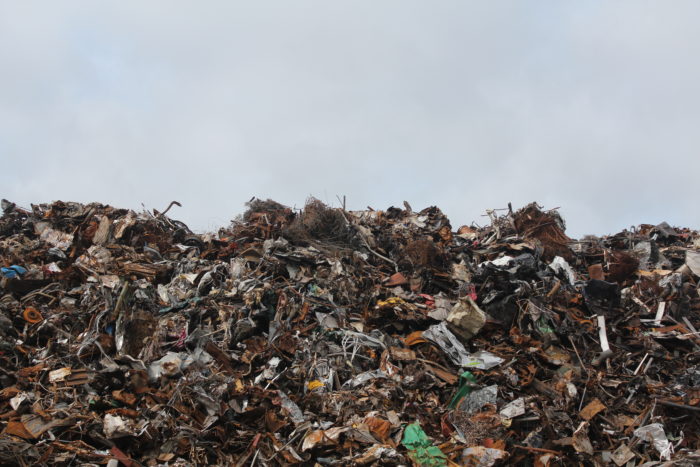
For some, food waste seems inevitable. Moldy bread, uneaten leftovers, a new recipe gone horribly wrong–that’s what garbage cans are for, right? It may be easy to just toss out that brown head of lettuce or the remnants of a satisfying meal, but what effect does this have on the environment?

In America, each person wastes about 240 pounds of food each year–food that eventually makes its way to overflowing landfills. Since landfills are not specifically created to break down organic waste, the food sits indefinitely until it can decompose. Due to the fact that landfills are tightly sealed and contain minimal amounts of oxygen, organic waste decomposes anaerobically–producing high amounts of methane gas.
When captured and used correctly, methane gas is a remarkable source of energy; however, landfills that are not designed for this process and release the gas into the air instead–contributing to global warming.
Throwing out unwanted food doesn’t just harm the environment–it affects your budget as well! Each household squanders over $640 each year due to wasted food. So, whether you want to save the environment from global warming or save your bank account from unnecessary spending–say goodbye to food waste with these 6 easy tips!
1. Be a Mindful Shopper – In a nutshell, shop smart! Planning out your meals ahead of time is a great way to be prepared when you go shopping. Take account of what products you already have at home and make a detailed grocery list before you go shopping–it will save you time and money! This way, you only buy what you need and decrease the likelihood of food spoiling before you are able to use it.
2. Don’t Cook Too Much – Yes, at times our eyes can be larger than our stomachs and cooking the right amount of food can be tricky. Take account of the recommended serving sizes on various products and make smaller portions. If you do happen to cook too much, save it for lunch the next day!
3. Understand Expiration Dates – There are a wide variety of dates that can be listed on a product–a “sell by” date, a “best if used by” date, a “guaranteed fresh” date, and even a “use by” date. These dates generally refer to the suggested time frames for which an item’s freshness is at its peak. As a rule of thumb, if a product is showing signs of spoiling, it should not be eaten. This is yet another reason why planning out meals beforehand is so important! Take account of what is nearing its expiration date and cook those items first.
4. Store Food Properly – To prevent items such as rice, chips, and cereal from going stale, store them in airtight containers. Bread will also become stale if it is kept in the refrigerator, so always keep bread at room temperature. Since many food items are kept in the fridge, prevent spoilage by making sure your fridge (and freezer) are set at the right temperatures! Refrigerators should be below 40°F while your freezer should be set at 0°F. Salads, fruits, and vegetables are the most wasted food items and should be stored as follows:
- Tomatoes, avocados, pears, bananas, and melons can all be kept on kitchen countertops.
- Apples, berries, carrots, cauliflower, salad, and celery are best stored in refrigerator drawers.
- Potatoes, onions, and garlic should be kept in a dark, cool place, such as a pantry.
5. Rearrange Your Fridge – Rearranging the items in your fridge can minimize food spoilage and save you money too! Check the expiration dates on all of your items and put those nearing their deadline front and center so they can be used first. Most leftovers can be stored for up to 4 days, so arrange them accordingly. Since the refrigerator door’s temperature fluctuates the most from being opened frequently, only store condiments there. Keep your almond, soy, or coconut milk safe by storing it on a middle shelf.
6. Compost – Although banana peels are actually a great source of nutrients, they are a common example of organic waste that some find unavoidable. For this reason, compost bins are a terrific alternative to throwing out food scraps and other organic waste. And if you think your studio apartment is too tiny for a compost bin–think again! Compost bins are relatively easy and inexpensive to make–and you can compost indoors without the help of any worms!

How do you minimize food waste in your home?
Also by Audrey: Soothe Your Aches & Pains With These 5 Lovely DIY Herbal Remedies
Related: 5 Savvy Tricks to Streamline Your Household, Save $$$, and Help the Planet
5 Zero-Waste Tips To Be A Total Eco Goddess This Festival Season
Get more like this–sign up for our newsletter for exclusive inspirational content!
__




